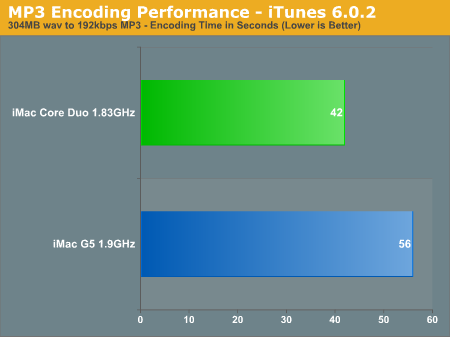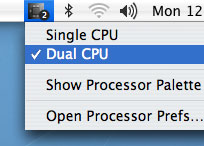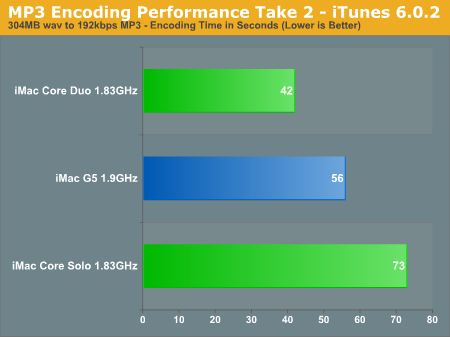Apple Makes the Switch: iMac G5 vs. iMac Core Duo
by Anand Lal Shimpi on January 30, 2006 11:26 PM EST- Posted in
- Mac
Media Encoding Performance with iTunes and Quicktime
The encoding tests here are identical to the ones that we run in our CPU tests, except obviously run under Mac OS X 10.4.4 instead of Windows XP. It's important to note that iTunes, Quicktime as well as the iLife and iWork suites are all Universal applications, meaning that they run natively on both PowerPC and x86 architectures. The performance comparisons on these next few pages is done without any binary translation.
Let's take a look at Quicktime next; once again, this is the same test that's run in our CPU reviews. This time around, I've included the Core Solo from the start:
The encoding tests here are identical to the ones that we run in our CPU tests, except obviously run under Mac OS X 10.4.4 instead of Windows XP. It's important to note that iTunes, Quicktime as well as the iLife and iWork suites are all Universal applications, meaning that they run natively on both PowerPC and x86 architectures. The performance comparisons on these next few pages is done without any binary translation.



Let's take a look at Quicktime next; once again, this is the same test that's run in our CPU reviews. This time around, I've included the Core Solo from the start:











35 Comments
View All Comments
Anand Lal Shimpi - Tuesday, January 31, 2006 - link
Turning off one core leaves the full 2MB of cache for the other core to use since it is a shared L2.Take care,
Anand
Eug - Tuesday, January 31, 2006 - link
Cool thanks.
P.S. I have read elsewhere that the new iMac Core Duo uses less than half of the CPU's processing power to play back H.264 Hi-Def 1920x1080 video at a full 24 fps. If true, that's great, because my iMac 2.0 chokes on that. It plays back relatively smoothly, but only at about 12-15 fps.
That bodes well for a future single-core Yonah Mac mini.
Then again, probably not, considering that I suspect the iMac Core Duo does so well on H.264 playback because of its Radeon X1600. I'd doubt the Mac mini would get anything close to that any time soon.
Anand Lal Shimpi - Tuesday, January 31, 2006 - link
Max CPU utilization (across both CPUs) when playing a 1080p stream scaled to fit the screen is about 60%, but it usually hovers below 50%. I am not sure whether or not the X1600's H.264 decode acceleration is taken advantage of (I doubt it), I'm trying to find out now. Also remember that on the PC side, the X1600 will only accelerate up to 720p.Take care,
Anand
Anand Lal Shimpi - Tuesday, January 31, 2006 - link
I just confirmed with ATI, the X1600's H.264 decode acceleration is currently not supported under OS X. ATI is working with Apple on trying to get the support built in, but currently it isn't there.Take care,
Anand
Eug - Tuesday, January 31, 2006 - link
Thanks again for the info. That's actually good news in a way. Things are looking up for that single-core Yonah Mac mini HTPC.
andrep74 - Tuesday, January 31, 2006 - link
Isn't performance/Watt a function of the CPU, not the platform?Kyteland - Tuesday, January 31, 2006 - link
That picture of Jobs doesn't say "PC vs Intel" it says "PowerPC vs Intel". Jobs is just standing in the way. He's comparing the old mac to the new mac.Calin - Tuesday, January 31, 2006 - link
You could think about it that way - but in the end, the buyer is interested on the total energy consumption/heat production (as this is what he pays for, and what he must get rid of).Have you heard of the Toyota D4D engine? It has a record of 2.4 liter (less than a gallon) diesel fuel used per a hundred kilometers (60 miles). However, the same engine on a Land Cruiser 4x4 all options will get you much less (four times less maybe).
It doesn't worths talking about performance per watt at the processor level, it is better at the platform level.
BUBKA - Tuesday, January 31, 2006 - link
Were these benches done with a USB 2.0 device plugged in?Furen - Tuesday, January 31, 2006 - link
I was under the impression that Intel was blaming Microsoft for that, so that would not apply to OSX, though if the driver works perfectly for every platform except Napa I'd guess its a hardware problem that MS will fix in software (which is well enough as long as it works). The power consumption difference is probably less than 10W anyway. It matters on a notebook but hardly matters with a desktop.